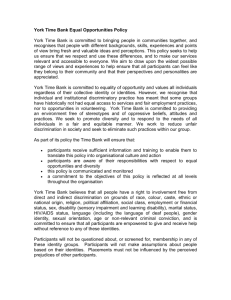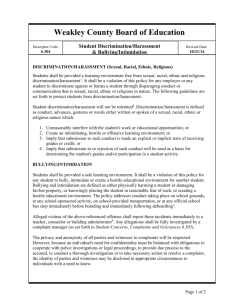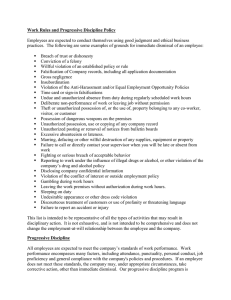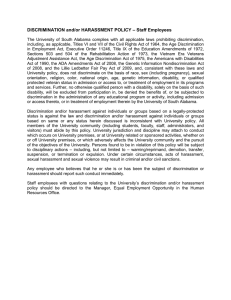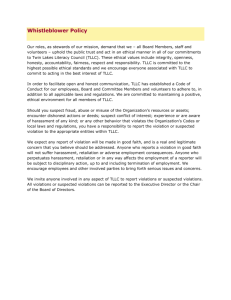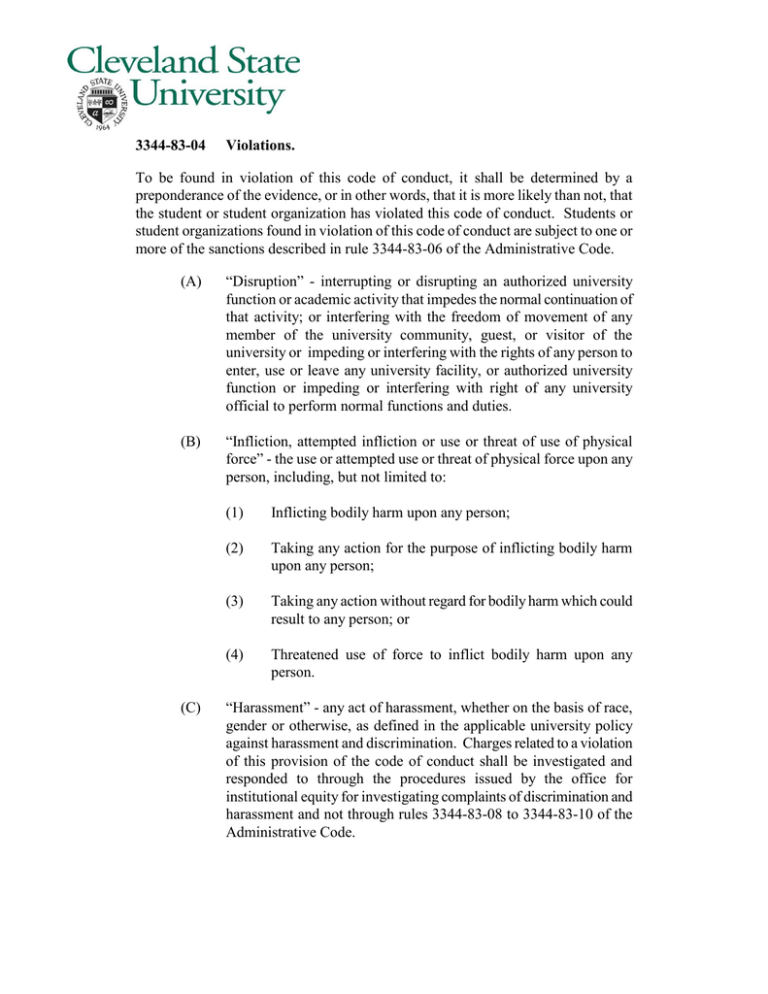
3344-83-04
Violations.
To be found in violation of this code of conduct, it shall be determined by a
preponderance of the evidence, or in other words, that it is more likely than not, that
the student or student organization has violated this code of conduct. Students or
student organizations found in violation of this code of conduct are subject to one or
more of the sanctions described in rule 3344-83-06 of the Administrative Code.
(A)
“Disruption” - interrupting or disrupting an authorized university
function or academic activity that impedes the normal continuation of
that activity; or interfering with the freedom of movement of any
member of the university community, guest, or visitor of the
university or impeding or interfering with the rights of any person to
enter, use or leave any university facility, or authorized university
function or impeding or interfering with right of any university
official to perform normal functions and duties.
(B)
“Infliction, attempted infliction or use or threat of use of physical
force” - the use or attempted use or threat of physical force upon any
person, including, but not limited to:
(C)
(1)
Inflicting bodily harm upon any person;
(2)
Taking any action for the purpose of inflicting bodily harm
upon any person;
(3)
Taking any action without regard for bodily harm which could
result to any person; or
(4)
Threatened use of force to inflict bodily harm upon any
person.
“Harassment” - any act of harassment, whether on the basis of race,
gender or otherwise, as defined in the applicable university policy
against harassment and discrimination. Charges related to a violation
of this provision of the code of conduct shall be investigated and
responded to through the procedures issued by the office for
institutional equity for investigating complaints of discrimination and
harassment and not through rules 3344-83-08 to 3344-83-10 of the
Administrative Code.
3344-83-04
2
(D)
“Sexual misconduct” - any act of sexual violence, sexual exploitation
or sexual harassment, as defined in the applicable university policy
against harassment and discrimination, whether such conduct occurs
on or off campus. Charges related to a violation of this provision of
the code of conduct shall be investigated and responded to through
the procedures issued by the office for institutional equity for
investigating complaints of discrimination and harassment and not
through rules 3344-83-08 to 3344-83-10 of the Administrative Code.
(E)
“Endangering health and safety” - taking or threatening action that
endangers the safety, physical or mental health, or life of any person,
or creates a reasonable fear of such action, including, but not limited
to, stalking, relationship violence or domestic violence, as defined in
the applicable university policy against harassment and
discrimination. When charges related to a violation of this provision
of the code of conduct involve stalking, relationship violence or
domestic violence, they shall be investigated and responded to
through the procedures issued by the office for institutional equity for
investigating complaints of discrimination and harassment and not
through rules 3344-83-08 to 3344-83-10 of the Administrative Code.
(F)
“Hazing” - any conduct, act, method of, or coercion of another to do
an act of initiation or admission into any organization, which occurs
on or off university premises and which willfully or recklessly, causes
or creates a substantial risk of causing physical or mental harm to any
student or other person. Examples include, but are not limited to,
extended deprivation of sleep or rest; forced consumption of food,
liquor, other beverages, or drugs; beating or branding; forced
exclusion from social contact; and/or forced conduct, which could
result in embarrassment to any person. Any activity or behavior
meeting the definition as described in this paragraph shall be
considered a forced activity, notwithstanding the willingness of the
individual involved to participate in such activity.
(G)
“Theft of property” - theft or attempted theft of university property or
the property of any person or other entity, including possession or use
of stolen property. This shall also include theft of university property
while off university premises.
3344-83-04
3
(H)
“Unauthorized entry into a university facility “- attempted or forcible
breaking or unauthorized entry into any building, or facility.
(I)
“Failure to vacate university premises” - failure to vacate university
facilities at the closing hours or at the request of a university official,
unless prior approval is obtained to remain on the premises.
(J)
“Creation of safety hazard(s)” - creating a fire hazard, including the
setting or attempted setting of fires, or otherwise endangering the
safety of persons or property or the improper use or possession of
inflammable or hazardous substances.
(K)
“False reporting of an emergency”- intentionally making a false report
of a bomb, fire, or other emergency in any building, or facility by
means of activating a fire alarm or in any other manner.
(L)
“Unauthorized use or alteration of emergency or safety equipment” unauthorized use or alteration of fire-fighting equipment, safety
devices, or other emergency or safety equipment.
(M)
“Interference with emergency evacuation procedure” - interference
with emergency evacuation procedures, including failure to evacuate,
prescribed for any building, or facility.
(N)
“Possession, use, distribution sale of controlled substances or drugrelated paraphernalia” - knowingly possessing, using, distributing
and/or selling drug-related paraphernalia and/or controlled
substances, including, but not limited to, narcotics, barbiturates,
hallucinogens, marijuana, or amphetamines, except as authorized by
law.
(O)
“Illegal use of alcoholic beverages” - knowingly possessing, keeping,
consuming, allowing to consume, serving, purchasing, selling,
making available to another person or directly providing funding for
alcoholic beverages in violation of state or local statutes, ordinances,
rules and regulations university rules and regulations.
(P)
“Falsification of records, fraud and false testimony” - furnishing false
or misleading information or identification to a university official,
office, investigation or proceeding; or without proper authorization,
3344-83-04
4
reproducing, copying, forging, tampering, altering, falsifying,
misusing, or attempting to do the foregoing to any record, document,
or identification used or maintained by the university.
(Q)
“Destruction or misuse of property” - damaging, destroying, defacing,
abusing, tampering, misusing, or attempting to damage, destroy,
deface, abuse, misuse or tamper with university property or property
of any person or other entity on or off university premises. This
includes any attempt to alter the function or performance of university
equipment or property, including, but not limited to, university
computers.
(R)
“Bribery” - offering money, any item, or service to a student,
administrator, faculty or staff member so as to receive university
property and/or services for one’s self or another or to gain an
advantage or special treatment for one’s self or for another.
(S)
“Unauthorized access to records” - gaining or attempting to gain
unauthorized access to university records including but not limited to
paper records, computer files or systems.
(T)
“Unauthorized use of university computers” - gaining use or
attempting to gain use of university computers without proper
authorization including but not limited to unauthorized:
(U)
(1)
Use of computer and/or data processing equipment;
(2)
Access to computer systems;
(3)
Possession of computer software or data;
(4)
Copying or use of computer software or data;
(5)
Use of computer accounts; or
(6)
Use of computer-related equipment.
“Possession or use of weapons” - unauthorized possession or use of
any type of firearm, explosive, other weapon, or firework. “Weapon”
shall mean any instrument, device, substance or item capable of
3344-83-04
5
causing or inflicting injury or death and designed or specifically
adapted for use as a weapon or possessed, carried or used as a
weapon. Weapons used legitimately on campus for martial arts or
similar practice shall be permitted provided they are transported and
stored in a manner which makes them functionally inaccessible.
(V)
“Misuse of identification” - refusing to present identification when
requested by a university police officer or other university official
who identifies her/himself; using or attempting to use any means of
identification or other document or card not rightfully issued to the
individual; or altering, tampering with or misusing a university
identification card or other university-issued means of identification.
(W)
“Improper use of keys” - knowingly using, duplicating, or causing to
be duplicated, any key for any facility, building or room without
proper authorization or failure to return university-issued keys to the
proper university officials.
(X)
“Misuse of university telephone or communications devices” charging any long distance telephone call, telegraph message or
electronic facsimile to any university telephone without proper
authorization or using any university telephone for without proper
authorization.
(Y)
“Gambling” - violation of applicable gambling laws.
(Z)
“Failure to follow directions of university officials” - failure to follow
reasonable directions of a university official, made in the performance
of her or his duties, which are necessary for the proper conduct of
authorized university functions.
(AA) “Abuse of the student conduct code procedures” - abuse of the
student conduct code procedures, including, but not limited to:
(1)
Falsification, distortion or misrepresentation of information to
the judicial affairs officer or before the student conduct
officer, the university judicial board, or the appeal board;
(2)
Disruption or interference with the orderly conduct of a
proceeding under this rule;
3344-83-04
6
(3)
Institution of a proceeding under this rule knowingly without
cause;
(4)
Attempting to discourage an individual’s proper participation
in, or use of, the student conduct code procedures of this rule;
(5)
Attempting to influence the impartiality of the student
conduct officer, or a member of the judicial or the appeal
board prior to, and/or during the course of, a proceeding under
this code;
(6)
Harassment (verbal or physical) and/or intimidation of the
student conduct officer, or a member of the judicial or the
appeal board prior to, and/or during the course of, a
proceeding under this rule;
(7)
Failure to comply with any sanction imposed under this rule;
or;
(8)
Influencing or attempting to influence another person to
commit an abuse of the student conduct code under this rule.
(BB)
“Unauthorized sales and solicitation of funds” - unauthorized sale or
solicitation of funds including unauthorized solicitation of funds off
university premises.
(CC)
“Misuse of university name, logo, or seal” - use of the university’s
name without the express authorization of the university except to
identify institutional affiliation in the authorized manner. University
approval or disapproval of any political or social issue may not be
stated or implied by an organization; or use of official letterhead
stationery, envelopes, logo or seal as part of any publication,
correspondence or other printed material without prior submission of
the material to, and written permission received from, the appropriate
university official(s).
(DD) “Misuse of university funds/student organization funds” - the misuse
or unauthorized use of university funds or student organization funds
administered through the university.
3344-83-04
7
(EE)
“Unauthorized posting or distribution of materials on university
premises” - failure to abide by university policies, rules, and
regulations on posting and distribution of materials on university
premises.
(FF)
“Violations of university regulations” - violating other university
regulations or policies, which have been posted or publicized.
Violations of applicable harassment and discrimination policies shall
be investigated and responded to through the procedures issued by the
office for institutional equity for investigating complaints of
discrimination and harassment not through rules 3344-83-08 to 334483-10 of the Administrative Code.
(GG) “Failure to comply with university sanctions” - failure to comply with
sanctions imposed pursuant to university policy and/or regulations.
(HH) “Repetitions of misconduct” - more than one violation of this code for
which a sanction has been previously imposed. When the repeated
misconduct involves a violation of paragraphs (C), (D), or (E) of this
rule, it shall be investigated and responded to through the procedures
issued by the office for institutional equity for investigating
complaints of discrimination and harassment and not through rules
3344-83-08 to 3344-83-10 of the Administrative Code.
(II)
“Participation as an accomplice” - knowingly participating in any
action or event that constitutes any violation of this code. When the
participation as an accomplice involves a violation of paragraphs (C),
(D), or (E) of this rule, it shall be investigated and responded to
through the procedures issued by the office for institutional equity for
investigating complaints of discrimination and harassment and not
through rules 3344-83-08 to 3344-83-10 of the Administrative Code.
(JJ)
“Violation of state, federal or local law” - violating state, federal or
local law whether the violation occurs on or off campus. When the
violation of state, federal or local law involves a violation of
paragraphs (C), (D), or (E) of this rule, it shall be investigated and
responded to through the procedures issued by the office for
institutional equity for investigating complaints of discrimination and
harassment and not through rules 3344-83-08 to 3344-83-10 of the
Administrative Code.
3344-83-04
8
Policy Name:
Policy Number:
Approved:
Effective:
Violations
3344-83-04
11/19/2014
8/17/2015

